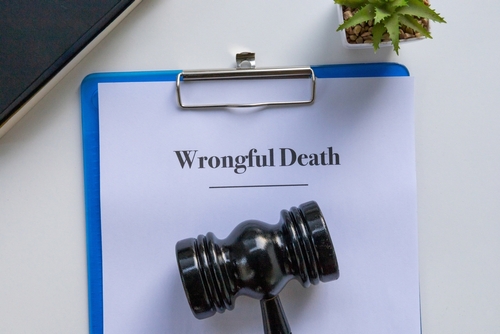Steven A. Bagen | October 7, 2025 | wrongful death

Is it possible to file a wrongful death claim against Alachua County or another government entity in Florida? The answer is yes. However, these claims are governed by a different and stricter set of rules than those against private individuals or companies.
The most significant differences are the requirements for formal notice and much shorter deadlines. Wrongful death lawyer in Alachua County under the Florida Wrongful Death Act, surviving family members have a legal path to seek financial stability. This covers devastating losses like medical bills, funeral costs, the income your loved one would have provided, and the loss of their companionship.
If you have questions about a recent loss and believe a government entity may be at fault, call us for a straightforward conversation about your situation. Our team at Steven A. Bagen & Associates, P.A. is here to help. Call (800) 800-2575.
Key Takeaways for Wrongful Death Claims Against Alachua County
- You have only six months to provide formal notice. This is a strict deadline, and missing it bars you from filing a lawsuit, regardless of the strength of your case.
- The claim must be based on government negligence. You must prove the county failed to use reasonable care in maintaining public property or that one of its employees acted negligently, directly causing the death.
- Financial recovery is capped by state law. Florida’s sovereign immunity laws generally limit damages against government entities to $200,000 per person and $300,000 per incident, making these cases financially distinct from claims against private parties.
When Can a Government Entity Like Alachua County Be Held Responsible for a Wrongful Death?

How do you determine if the county was legally at fault for your loss? It ultimately boils down to a legal standard called negligence, which simply means the county failed to use reasonable care, and that failure caused your loved one’s death.
Proving this is difficult. For example, was a dangerous road condition just an unfortunate circumstance, or did it result from the county failing to perform maintenance after being warned of the danger? The answer lies in establishing the county’s “duty of care.” Florida’s Wrongful Death Act means the county has a legal responsibility to maintain public property and operate its services in a way that does not create an unreasonable risk of harm.
Common examples of government negligence that lead to wrongful death claims against Alachua County include:
- Failure to Maintain Public Property: This covers poorly maintained roads with deep potholes, malfunctioning traffic signals, or unsafe conditions in public parks and buildings that cause a fatal incident. While not every accident is due to negligence, poorly maintained infrastructure contributes to collisions.
- Negligence of Government Employees: A county employee driving a vehicle recklessly and causing a crash is a clear example. Other instances might involve a 911 dispatcher failing to follow protocol, which results in a delayed emergency response.
- Dangerous Conditions on Public Transportation: This could involve issues with county-operated buses or other public transit services that lead to a fatal accident.
- Failure to Provide Adequate Security: In certain situations, a lack of security at a public facility or county-sponsored event could lead to a preventable death. This is particularly relevant given that local agencies in Alachua have proactive community programs aimed at reducing crime. A failure to uphold safety standards in these areas could be grounds for a claim.
The Six-Month Notice: Why Claims Against the Government Have a Shorter Fuse
In most wrongful death cases in Florida, your family has two years from the date of death to file a lawsuit. But when the claim is against a government body like Alachua County, a strict deadline appears much sooner. You must provide a formal written notice of the claim to the government entity within six months of the incident.
This rule exists for a specific reason. Under a legal principle called sovereign immunity, you must first give the government a formal opportunity to investigate your claim and potentially settle it before you are allowed to file a lawsuit in court. Think of it as a mandatory heads-up. Before taking the county to court, the law requires you to present your case to them directly, giving them a set period to conduct their own review.
This formal notice is a detailed document that must include:
- Your name and contact information.
- A clear account of what happened, including the date, time, and location.
- A description of your family’s loss and the damages you are claiming.
After receiving your notice, the government has a 180-day investigation period. During this time, they may deny the claim, offer a settlement, or simply not respond. You are not permitted to file a lawsuit until this period expires or your claim is officially denied. This short, strict deadline is one of the most common reasons that valid wrongful death claims against Alachua County are lost. The immense grief and disruption following a death make it incredibly difficult to think about legal timelines. This is why connecting with a law firm that handles these specific types of cases is a practical first step. We understand this process and ensure all notifications are filed correctly and on time, protecting your family’s right to pursue the claim and secure fair wrongful death settlements paid under Florida law.
What Financial Support Can Your Family Pursue Under Florida’s Wrongful Death Act?
No amount of money will ever replace a loved one. The legal system understands this. A wrongful death claim is not designed to assign a monetary value to a human life but to provide financial stability for the family members left to cope with the loss. The goal is to address the tangible and intangible losses that ripple through a family after a preventable death.
The Florida Statutes, Section 768.21, defines two primary types of damages recoverable in these cases. Let’s break them down.
Damages for the Estate
These are financial losses that belong to the estate of the person who passed away. They cover costs the deceased incurred or income they would have earned.
- Lost wages and benefits: The income the deceased would have earned between the time of their injury and their death.
- Lost prospective net accumulations: This is the value of earnings the estate would have collected if the person had lived a normal lifespan, minus what they would have spent on themselves.
- Medical and funeral expenses: Any costs related to the final injury and burial that were paid directly by the estate.
Damages for the Survivors
These are paid directly to eligible family members to compensate them for the personal impact of the loss.
- Loss of support: The value of the income and services the survivor would have received from the deceased.
- Loss of companionship and protection: For a surviving spouse, this acknowledges the loss of their partner.
- Loss of parental companionship, instruction, and guidance: For surviving minor children.
- Mental pain and suffering: This is available for the spouse, minor children, and in some cases, parents.
Our role at Steven A. Bagen & Associates, P.A. is to build a comprehensive case that reflects the full scope of your family’s financial and emotional losses so you may focus on healing.
Who Is Considered a “Survivor” and Eligible to File?
Under Florida law, not every family member is automatically eligible. The law is very specific about who qualifies as a survivor.
The lawsuit itself is filed by the deceased’s personal representative, who is either named in a will or appointed by the court. This representative then acts on behalf of both the estate and all eligible survivors to pursue the claim.
Florida law typically defines the following individuals as survivors:
- The Spouse: The surviving husband or wife.
- Minor Children: Children under the age of 25 are considered minors for the purpose of the Wrongful Death Act.
- Parents: The parents of a deceased minor child may recover damages. If an adult child dies and leaves no other survivors (like a spouse or children), their parents may also be eligible.
- Dependent Relatives: Other blood relatives or adoptive siblings may qualify if they show they were partly or wholly dependent on the deceased for financial support or services.
Notably, Florida’s laws in this area are intricate. For example, in the context of medical malpractice, there are sometimes restrictions on whether adult children may recover non-economic damages for the loss of a parent, which can also affect the overall wrongful death settlement amount a family may receive.
How Does Negligence Look in the Real World? Common Scenarios in Alachua County

The legal idea of government negligence feels abstract. Making it tangible with real-world examples helps clarify when a valid claim might exist. The age-adjusted death rate in Alachua County in one recent year was 738.4 per 100,000 people, a rate higher than the state average, and in some of these cases, negligence could be a factor. Here are some common scenarios.
- Scenario 1: A Fatal Car Accident at a Known Dangerous Intersection. A driver is killed at an intersection where the traffic light has been broken for several weeks. Multiple residents reported the malfunction to the county, but no repairs were made. In this case, the county was “on notice” of a dangerous condition and failed to take reasonable steps to fix it.
- Scenario 2: A Drowning in a Public Pool Without Proper Supervision. A child drowns in a county-operated swimming pool. An investigation reveals that the on-duty lifeguard was not properly trained according to state standards or had abandoned their post. The county has a duty to ensure safety at its public facilities, including providing competent staff.
- Scenario 3: A Death Resulting from a Delayed Emergency Response. A 911 dispatcher sends an ambulance to the wrong address, causing a significant delay in medical care for someone suffering a heart attack. The county is responsible for the proper functioning and administration of its emergency services.
- Scenario 4: A Fatality Caused by a County Vehicle. A county sanitation truck runs a red light and causes a fatal collision. Just like any other employer, the county is generally liable for the negligent actions of its employees while they are performing their job duties.
Frequently Asked Questions About Wrongful Death Claims in Alachua County
What if my loved one was partially at fault for the accident?
Florida follows a comparative negligence rule. This means that even if your loved one was partially to blame for the incident that led to their death, your family may still recover damages. The total compensation award would simply be reduced by your loved one’s percentage of fault. However, if they are found to be more than 50% responsible, the claim is barred.
How much does it cost to hire a wrongful death lawyer?
We handle these cases on a contingency fee basis. This means our firm is only paid if we successfully recover compensation for your family. There are no upfront fees for our services, and we cover the costs of investigating and building the case. Our fee is a percentage of the final settlement or award.
Are there caps on how much we can recover from the county?
Yes. Under Florida’s sovereign immunity laws, damages against most government entities are typically capped at $200,000 per person and $300,000 per incident. Recovering an amount higher than this cap requires the difficult and lengthy process of getting a special “claims bill” passed by the Florida Legislature.
Does it matter where in Alachua County the death occurred?
The same state laws apply whether the incident happened in Gainesville, Newberry, Archer, or any other part of Alachua County. The determining factor is not the location but whether a government entity was responsible through its negligence or wrongful act.
How are wrongful death settlements paid out?
In most cases, settlement funds are paid in a lump sum. The personal representative then has the legal duty to distribute the funds to the estate and to the individual survivors according to the terms of the settlement or the court award, supported by the evidence needed to prove wrongful death and justify the compensation received.
Your Family Deserves Answers. Let Us Help You Find Them.

The path to holding a government entity accountable may seem complicated, but you do not have to walk it alone. Your focus should be on your family. Let our focus be on securing the stability and justice you are owed under the law.
To discuss the specifics of your case in a clear, no-obligation conversation, call Steven A. Bagen & Associates, P.A. today at (800) 800-2575.
